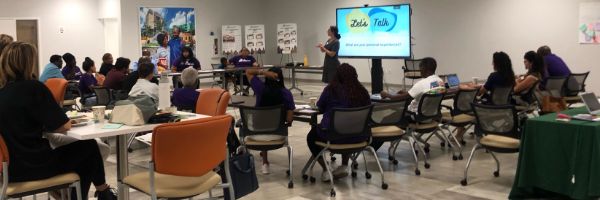Partners
(Pictured: Associate Director Abigail Fleming leads a public meeting.)
The Clinic uses data and screening tools, investigation, and lived experiences of our partners to ensure that its work remains focused on communities of color, such as Overtown, the West Grove, Opa-Locka, Miami Gardens, Allapattah, Liberty City, and Riviera Beach. In pursuing its cases and campaigns, the Clinic employs community and movement lawyering principles and approaches, including community leadership, collaboration, integrated legal and political advocacy, and accountability to clients and communities.
The Clinic works closely with and relies on many partners in its work. These partners tend to be environmental, health, worker, and neighborhood organizations, though we also partner with governmental entities when our goals are aligned. A few of our partners include Everglades Law Center, Miami Waterkeeper, Earthjustice, Our Children’s Trust, Urban Health Partnerships, GRACE, WeCount!, and the Lakeview Area Neighborhood Association.
Resources
Community Benefits Agreement Template & General Resources
A Community Benefits Agreement (CBA) is a legally binding, private contract between a developer and community-based organizations. CBAs aim to benefit both parties: the developer commits to providing specified community benefits and community groups agree to support the project in the governmental approval process. Through CBAs, low-income communities can shape development projects to benefit their neighborhoods. In May 2020, alongside community partners (Catalyst, the Community Justice Project, and the Corporate Social Responsibility Foundation), the EJC took part in the development of the Model CBA Resource Guide, which was based on the Community Benefits Agreements: Template and Resources template the EJC developed.
Displacement Vulnerability and Mitigation Tool Template
Displacement is defined as the involuntary relocation of households and/or businesses due to direct development or because of increasing market values, rents, or changes in the neighborhood’s ability to meet basic needs. Of particular relevance in South Florida is the displacement that occurs as a result of climate gentrification. Climate gentrification occurs when climate-driven development (i.e., when areas more resilient to the effects of climate change such as those that have higher elevations are targeted for development), displaces existing low-to-moderate-income marginalized communities.
In response to concerns raised by the Clinic’s community partners, the EJC developed the Displacement Vulnerability and Mitigation Tool, or DVMT for short. The DVMT is designed for municipalities to assess and mitigate the risk of displacement of protected classes and vulnerable populations created by proposed developments during the permitting process. It equips real-estate developers and local municipalities with research-informed strategies to mitigate and redress the segregative effects that can occur when residents are displaced and re-segregated.
Help us Make a Difference
Make a Gift Today



